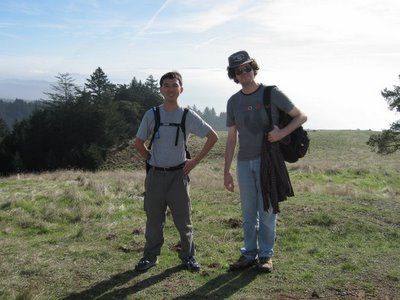Lisa's all-in-one stereo system broke, and she asked if I would get her one. "It doesn't have to be too expensive," she said, "it's not like either of us are picky about sound systems." "Wait a minute, I'm picky!" Then I realized that for my entire adult life, I had never even owned a pair of speakers.
So the day after Christmas, we took the time to visit Magnolia Audio/Video in Palo Alto (we were on the way home after a lunch with some of Lisa's friends in South San Francisco). My best audio system is a pair of Sennheiser 600s hooked up to a Headroom headphone amp. The combination sounds incredibly good, and I didn't expect to be able to approach the quality in a full size stereo system without a lot of money, but I wanted a calibration against what was possible.
I hate shops that employ sales people, so we first had to wait patiently to find a sales guy who would open up one of their listening rooms so we could hear what a really good system would sound like. Our first listen was to a pair of $1400 speakers mated to a $1400 integrated amp. This was our first experience with a true hi-fi system, and it truly was amazing. The speakers did disappear into the background and we could locate the singer and instruments in appropriate locations inj front of us. We were impressed, but not prepared to fork out $2800, especially since we knew our listening location would not be as ideal as a listening room in a hi-end audio shop.
We walked out to try to find another audio shop, but none of the other audio places were opened on the day after Christmas, so we came back and walked around. In the clearance area of the store, however, I spotted a pair of Boston Acoustics CR95 speakers at 50% off. ($300 a pair) Lisa admired the maple box, which would fit in with the rest of the decor, so we asked to audition it against other speakers.
The sales guy moved the speakers into the room and wired it up, and after some time, we got to compare it against a set of $1200 speakers. These sounded just as good to us as the more expensive pair, so I knew we would buy the speakers. Then it was a matter of finding an amplifier. We auditioned three Denons: the DRA 295, a 50W amp, the 85W version, and the 100W version. The 100W version was clearly bad --- the speakers sounded like they were being overpowered. (All amplifiers sound the same, so there's no point auditioning different brands --- shop by power, price and features) The difference between the 50W and the 85W version was subtle --- Lisa couldn't tell the difference, and I could barely tell the difference (and it could easily have been my imagination). Given that our apartment was so small that even the 50W could drive the speakers louder than our neighbors could stand, we saved the $100 and bought the 50W integrated amplifier ($230), which came with AM/FM and video capability. The Toshiba DVD player I'd bought 4 years ago would play CDs, so we were set except for cables, one set of which would be used to drive the amp from my ipod.
It took an hour to get everything set up once we got home, but the sound was still amazing when we were done. I was impressed by how good everything sounded, and Lisa spent a good part of the day listening to music just because of how good it sounded. In fact, the resolution of the system was so good that I quickly became disappointed by how the ipod sounded compared to the same CD played through the Toshiba DVD player. I'd spent the better part of 3 days turning my CD collection into 320-VBR MP3s for my ipod, and now it looks like I prefer the sound of the CDs to the convenience of the ipod.
Saturday, December 31, 2005
Friday, December 30, 2005
Excession, by Iain Banks
A culture novel, Banks' utopia where Minds (AIs) determine the future of a human-like race. This is a reasonably good novel, on par with Consider Phlebas, but not as good as his best culture novel, Use of Weapons. A nit-picky detail: 32-bit identifiers for his minds isn't very realistic, even though they look neat (structured like IP addresses). Nevetheless, this book is complex enough that a second reading showed up gaps in my first reading that I missed, so the book is still recommended. In particular, the conversation between minds (which would never be anything like what's described in this book) is entertaining.
The funniest part of the book comes early:
An Outside Context Problem was the sort of thing most civilizations encountered just once, and which they tended to encounter rather in the same way a sentence encountered a full stop. The usual example given to illustrate an Outside Context Problem was imagining you were a tribe on a largish fertile island; you'd tamed the land, invented the wheel or writing or whatever, the neighbors were cooperative or enslaved but at any rate peaceful and you were busy raising temples to yourself with all the excess productive capacity you had, you were in a position of near aboslute power and control which your halloweed ancestors could hardly have dreamed of and the whole situation was just running along nicely like a canoe on wet grass... when suddenly this bristling lump of iron appears sailless and trailing steam in the bay and these guys carrying long funny-looking sticks come ashore and announce you've just been discovered, you're all subjects of the Emperor now, he's keen on presents called tax and these bright-eyed holy men would like a word with your preists.
The funniest part of the book comes early:
An Outside Context Problem was the sort of thing most civilizations encountered just once, and which they tended to encounter rather in the same way a sentence encountered a full stop. The usual example given to illustrate an Outside Context Problem was imagining you were a tribe on a largish fertile island; you'd tamed the land, invented the wheel or writing or whatever, the neighbors were cooperative or enslaved but at any rate peaceful and you were busy raising temples to yourself with all the excess productive capacity you had, you were in a position of near aboslute power and control which your halloweed ancestors could hardly have dreamed of and the whole situation was just running along nicely like a canoe on wet grass... when suddenly this bristling lump of iron appears sailless and trailing steam in the bay and these guys carrying long funny-looking sticks come ashore and announce you've just been discovered, you're all subjects of the Emperor now, he's keen on presents called tax and these bright-eyed holy men would like a word with your preists.
Wednesday, December 28, 2005
Tuesday, December 27, 2005
Vehicle Hell
First, Lisa bashed the car into a lamp-post after taking my mom to the airport. It's minor damage, but the body shops are quoting $1100 for repair, which is too much for a 7 year old car, so we're just going to spend $8 on touch-up paint and letting it sit as is.
Then, on Christmas day, the front deraileur cable of the tandem broke in the middle of a short ride. Having only the granny to ride home with was kinda fun. Not. This wasn't too bad to fix. After that, we went on a ride on the day after Christmas. There, we discovered that the 30 tooth, the 27 tooth, and the 24t cogs are worn down enough that the (relatively new) chain was skipping, making standing impossible in those gears. A replacement cassette (at a Performance Bikes sale) was $68.
A great way to end 2005!
Then, on Christmas day, the front deraileur cable of the tandem broke in the middle of a short ride. Having only the granny to ride home with was kinda fun. Not. This wasn't too bad to fix. After that, we went on a ride on the day after Christmas. There, we discovered that the 30 tooth, the 27 tooth, and the 24t cogs are worn down enough that the (relatively new) chain was skipping, making standing impossible in those gears. A replacement cassette (at a Performance Bikes sale) was $68.
A great way to end 2005!
Monday, December 26, 2005
Philip Pullman in The New Yorker
This week's New Yorker has a great article about Philip Pullman, including his opinion about Tolkein, C.S. Lewis, and the themes behind His Dark Materials. The entire article is worth reading, and Pullman makes great points about Tolkein & Lewis' works.
His books have been likened to those of J. R. R. Tolkien, another alumnus, but he scoffs at the notion of any resemblance. “ ‘The Lord of the Rings’ is fundamentally an infantile work,” he said. “Tolkien is not interested in the way grownup, adult human beings interact with each other. He’s interested in maps and plans and languages and codes.” When it comes to “The Chronicles of Narnia,” by C. S. Lewis, Pullman’s antipathy is even more pronounced. Although he likes Lewis’s criticism and quotes it surprisingly often, he considers the fantasy series “morally loathsome.”
In Pullman’s view, the “Chronicles,” which end with the rest of the family’s ascension to a neo-Platonic version of Narnia after they die in a railway accident, teach that “death is better than life; boys are better than girls . . . and so on. There is no shortage of such nauseating drivel in Narnia, if you can face it.”
Sexual love, regarded with apprehension in Lewis’s fiction and largely ignored in Tolkien’s, saves the world in “His Dark Materials,” when Lyra’s coming of age and falling in love mystically bring about the mending of a perilous cosmological rift. “The idea of keeping childhood alive forever and ever and regretting the passage into adulthood—whether it’s a gentle, rose-tinged regret or a passionate, full-blooded hatred, as it is in Lewis—is simply wrong,” Pullman told me.
His books have been likened to those of J. R. R. Tolkien, another alumnus, but he scoffs at the notion of any resemblance. “ ‘The Lord of the Rings’ is fundamentally an infantile work,” he said. “Tolkien is not interested in the way grownup, adult human beings interact with each other. He’s interested in maps and plans and languages and codes.” When it comes to “The Chronicles of Narnia,” by C. S. Lewis, Pullman’s antipathy is even more pronounced. Although he likes Lewis’s criticism and quotes it surprisingly often, he considers the fantasy series “morally loathsome.”
In Pullman’s view, the “Chronicles,” which end with the rest of the family’s ascension to a neo-Platonic version of Narnia after they die in a railway accident, teach that “death is better than life; boys are better than girls . . . and so on. There is no shortage of such nauseating drivel in Narnia, if you can face it.”
Sexual love, regarded with apprehension in Lewis’s fiction and largely ignored in Tolkien’s, saves the world in “His Dark Materials,” when Lyra’s coming of age and falling in love mystically bring about the mending of a perilous cosmological rift. “The idea of keeping childhood alive forever and ever and regretting the passage into adulthood—whether it’s a gentle, rose-tinged regret or a passionate, full-blooded hatred, as it is in Lewis—is simply wrong,” Pullman told me.
Sunday, December 25, 2005
Christmas Eve Steep Ravine/Matt Davis
With the forecast for weather in the mid-60s, we had to do a hike what I consider the prettiest hike in the Bay Area: Steep Ravine/Matt Davis. Usually, we do Matt Davis/Steep Ravine from Pantoll Ranger Station, but with heavy fog at the start, we opted for the reverse, descending Steep Ravine and coming up Matt Davis. This was the most beautiful I've ever seen the area. As a passing hiker said, "Nothing but scenery and more scenery. You're going to hate it!" Coming up Matt Davis was a surfacing out of the woods into gorgeous open space.
We shot well over 100 pictures on this hike that day, and you can see the selected shots below.
We shot well over 100 pictures on this hike that day, and you can see the selected shots below.
Subscribe to:
Comments (Atom)














